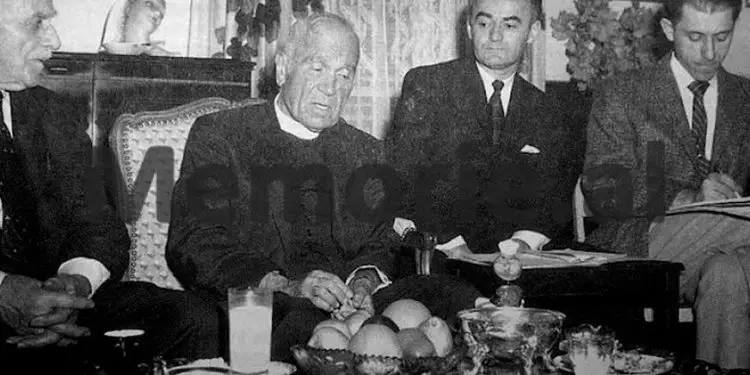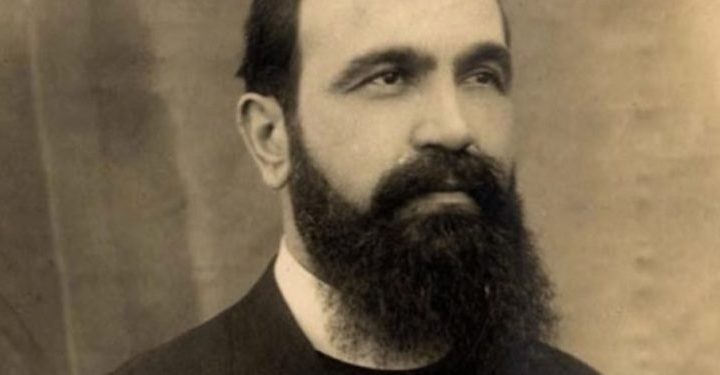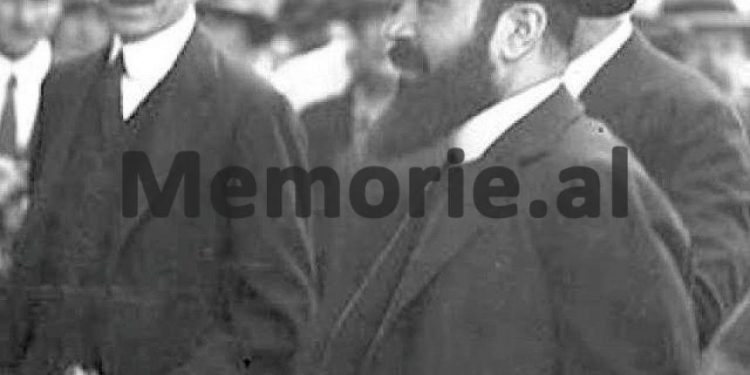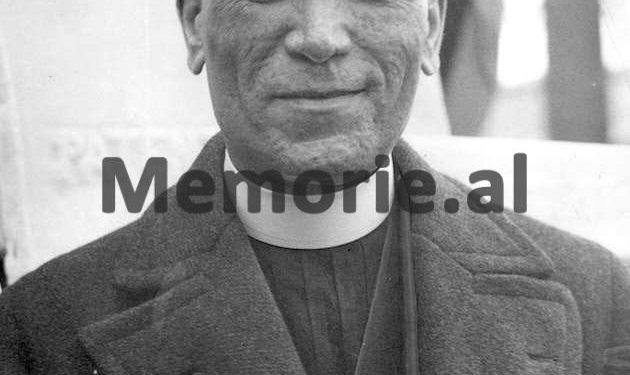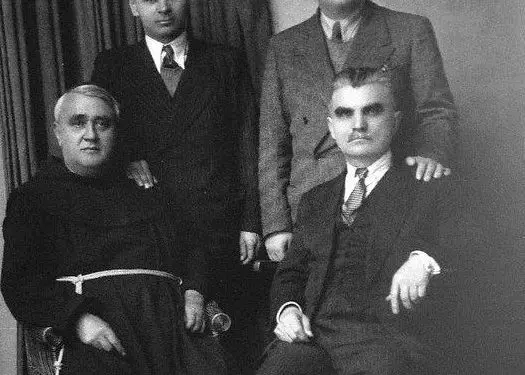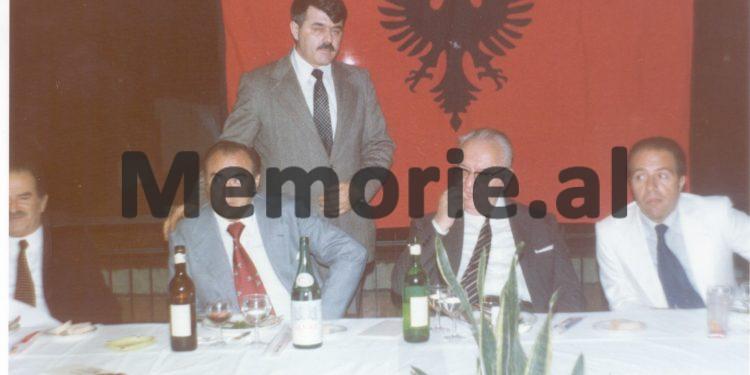Memorie.al publishes an unknown article by the poet, researcher, writer, publisher, politician and famous exponent of the Albanian anti-communist political exile in the West, Ernest Koliqi, about Stefan Stiljan Nolin, where he has written a brief biography of his origins and the family where Noli grew up, has stopped and analyzed some of the brightest sides of his political-patriotic activity, “the good consequences of which are still felt in the course of Albanian history and are: the establishment in 1909 of the notebook “Dielli “, prelude to the establishment of the Pan-Albanian Association “Vatra” in Boston, in 1912 in collaboration with Faik Konica, the savior acceptance of the Albanian state in the League of Nations on December 17, 1920, and the creation of the Albanian Autocephalous Orthodox Church. Even if we accept the hypothesis that Fan Noli had blemishes, these three excellent works make up for it. Of course, to these national and patriotic merits, the very, very big ones are added, such a writer who engraved his name with golden letters in the history of Albanian literature”.
Stefan Stiljan Noli, one of the most prominent personalities that the Albanian nation expressed from its gender, presents itself as a polyhedral face, i.e. very one-sided, which tired everyone’s mind when the moment comes to give a synthetic judgment on the role he played in the Albanian world. Whoever lives as happened to him for more than eighty years and in a historical period with the most storms known to humanity, easily becomes the object of criticism because such a long life is surrounded by its different phases, with lights and shadows which are probably caused by the surroundings, through which it was passed, but a will and predestined them brought to me as they came. Like all people with a special value, Fan Noli is honored and despised with persistence that often reaches parosism among his praises and praises.
Noli’s three immortal works
The truth is that the activity of a man who, during the eighth consecutive years of his life in this century, gave himself flesh and soul after building an ideal, which synthesized in him religious, national, social and cultural goals, should be in a straight steelyard. The mistakes that Fan Noli has committed, do not diminish the value of the three incomparable deeds that he did, the good consequences of which are felt even today in the course of Albanian history: the establishment in 1909 of the notebook “Dielli”, prelude to the establishment of the Pan-Albanian Association “Vatra” in Boston, in 1912 in collaboration with Faik Konica, the savior acceptance of the Albanian state in the League of Nations on December 17, 1920, and the creation of the Albanian Autocephalous Orthodox Church. Even if we accept the hypothesis that Fan Noli had blemishes, these three excellent works make up for it. Of course, to these national and patriotic merits are added the very, very great ones of this writer who carved his name with golden scrolls in the history of Albanian literature. But here we want to briefly point out the source of his inspiration among the lofty lyrical expressions that he gave us and emphasize how he found that source of inspiration in the real life of Albania, in the Albanian human source that he investigated and announced in those very few years of living in the land of origin. Even Fan Noli is a son of the diaspora: he was born and raised outside the land of the First. This is reflected in his entire literary activity. Among the eighty years of his life, only three or four were spent on Albanian soil. And that he understood and felt the need, especially as a poet and creator of literary beauty to absorb the spirit of the Albanian land, we doubt the myth of Anteu mentioned in the lyric dedicated to Bajram Curri: “Neither you kill nor you are being killed, / Legendary Ante is growing” . Who was Anteus and what did he represent in the classical mythology of Hellas? Anteu, son of the Earth (Ggea), a great and strong mammoth, had the power that no one could defeat; he touched the earth (his country) with the soles of his feet. Heracles found no other way to kill him, i.e. to take his suffocating breath, he only held her suspended with one hand without touching her leg. The symbolic view of the myth of Antaeus is clear: the native land, i.e. the place where people live from one blood and from one language, gives man moral strength, instills in him time after time the power of the soul. Fan Noli’s rare creative tendency, the extraordinary master of expression, he melts in translations (which are exemplary in the field of our letters) rather than in the original creations in poetry and in the narrative genre. He did not know enough about the life of the Albanian people. He did not know his experience among the various Albanian circles of the diaspora, considering his creative power, so sufficient that he came up with an original work, a poem or a romance, where the life of the people would be reflected, from Albanian blood passed through the light of his understanding. The two epic-lyrical poems, dedicated to Luigj Gurakuqi and Bajram Curri, where he skillfully engraves, with bold lines, the impressions left by these men, whom he met during his short stay in the Albanian homeland, testify to how much his literary works would have been precious, if fate had given him the opportunity to penetrate better and deeper into the heart of our people’s life.
A look at two poems by Noli
Let’s briefly analyze the content of these two poems, which in Albanian Parnaz reach the most glittering peaks of poetic brilliance. In the Albanian village of Thrace, Ibrik Tepe, where he was born at a very young age, Fan Noli showed the fine observational ability that nature had endowed him with. He cast his gaze around and tried to understand the unfolding events of life in front of him. Especially when you grew up, he tried to explain to himself the internal triggers that cause the good behavior of human vices, it will appear later in the satyrs that he left us. At that time, surely a question was drawn in the young mind of the kalaman vashtak: “Why do we speak another language and why are we different from the residents of the neighboring villages?” What questions, how many minds and senses do even the Arbreshs of Italy ask themselves: “We are Albanians? But what is Albania”. What qualities allow the Albanian to claim, you boasted, that you are the son of a noble nation? The face that left an indelible impression on the memory of Fan Nol in his childhood, that Gjergj Kapedani, commander after Nol Kapidan, his grandfather, of the military department that served the Sultan in the army in times of war. Gjergj Kapidani showed his bravery and that of the Albanians during the battles alongside the Ottoman army. Even Fan Noli’s father, Stiljani, nurtured his passion for church music, that of the cult of heroes. He admired Napoleon Bonaparte and Skanderbeg immensely. Stiljan’s admiration for Gjergj Kastrijot was passed on to his son Stefan, who later made requests among the archives and libraries for documents mostly about him and about his time to show mercy to the Albanian man in the Presidency of Kruja in great historical work that we all know. In a boy with a sensitive mind, inclined towards the analysis of the various causes that originate from the depths of his own and others’ souls and from the mysterious valve of the blood that beats in each one’s ear, it is natural to know the reason of the circumstances that characterize his special human conditions. Gjergj Kapidani spoke to him about Albanian bravery, his father, Stiljan Noli, praised Kastrjot’s actions. What basis did those glories and boasts really have? What kind of yeasts were floating in the Albanian blood? What were the special human qualities of the Albanian? Fan Noli, in the developments of his wandering life full of vicissitudes like those of the Homeric Odysseus, announced Albanian men who confirmed the assertions of George the Captain and his about the Albanian nobleman. In 1903, fate took him to Egypt, and during the three years he spent there, he had relationships with valuable men, such as: Spiro Dinen, Nikolla Naçon, Thanas Tashkon and Jani Vruhon. He touched with the simplicity of the idealistic nature of these torchbearers of our Renaissance, but he could think that they were exceptions. Is the Albanian nation really equipped with the properties dreamed of by patriots? He sought the answer to this question, as we said, in the history of the Albanian centenary of five hundred years in the epic of Gjergj Kastriot. And the pages of history confirmed his and Gjergj Kapedani’s assertions. They legalized the enthusiasm with which patriots mentioned the miraculous name, full of renaissance inspiration, of Skanderbeg. But, which flourished wonderfully in Skanderbeg, it was boiling again and again in the great heart of the Albanian nation, he saw it with his own eyes when he came to the land of the First in 1921 and lived there until 1924. The human dough from which Skanderbeg came out and the generation of Chelniks who followed him during the fight for freedom, still alive and able to express themselves admirably for the benefit of the nation.
The inspiration for Bajram Curri’s Gurakuq
In Luigj Gurakuqin and in Bajram Currin investigated the essence of Armenian nobility, the man, which is a writing of wisdom, i.e. the synthesis of a courageous jerk full of solitude together with a benefit or conception of life that has a basic pillar of honor and is expressed with a caution of words and behaviors which is based on the sense of right and conscientious people. Bravery has value when used in place and time to bring out the useful fruits. Fishta says: “But the wise man is never in a hurry / from the husband and not from the scare”. In Luigj Gurakuqin, Fan Noli announced the man who derives from the Albanian heritage, inherited from the First and shone brightly in the rays of a long culture. In Bajram Currin, the news glorified the sound masculine instincts that, with the twisting of loneliness and the clap of thunder, suddenly appear in the pursuit of the ideal, without leaving the lines of wisdom and without going away from the ancestral inheritance of honor and justice. These two unforgettable men inspired Fan Noli’s immortal poems where he praised the man, the canine and vital qualities of the chiefs of the Arbnuer tribe with a lyrical burst. Do you remember the important verses dedicated to Louis? “…My mother, I mourn for my brother, / He fell to us with three bullets…/ …For wanting you when you were not wanted, / For crying when you were laughing / For wearing you when you were undressed. / My mother was a martyr …/ My mother, what has he tried, / Honey mouth and iron heart, / Living orphan and dead orphan, / This liberating mammoth”. And those for Bajram Currin? “…O Bajram, the living Bajrak, / More nam with blood on his forehead, / To a cave of Dragobis. / A rare star of manhood…/ This cave was lit up with holy fire, / A castle rose wide in the sky / For the liberation of Albania / Catacomb of Dragobis”. Let’s note the same miserable fate of the three heroes sung by Fan Noli: Skanderbeg, Luigj Gurakuqi, and Bajram Curri, all three melted their lives for the ideal and ended without seeing the realizations and the glory. The poet weeps with tears the Albanian Orze man. I have known the two men, from Noli, both honor of the Nation, bright pillars of the ideal yesterday, today and in the most distant future, and I had the good fortune to be in close relations with them. Luigji encouraged me to take up literature and threw me into the political field in 1923, Bajrami, who lived with his family in a house of ours in Shkodër, kindly talked to me often about national issues. As a small but loyal employee, I also took part in the Government headed by Fan Noli in 1924 and, when that Government was overthrown, in known surroundings, as a fan I took the paths of exile and spent five years away from the homeland. Therefore, in commemoration of two great men, who are in the first place in the Olympus of heroes of the Nation and of the Poet, who praised his incomparable Arbnore self, I feel, for personal reasons. The task of bowing the head as a sign of immense respect./Memorie.al




